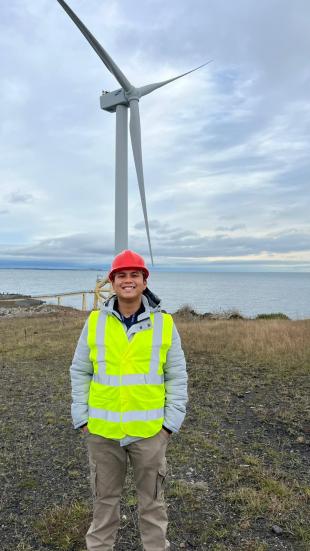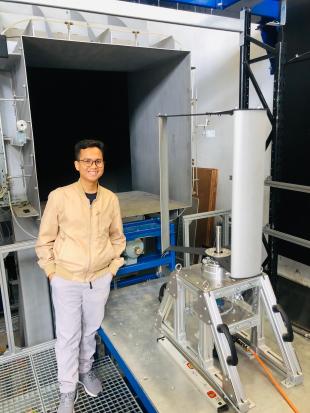EngD Project Title: Optimising Thermal Models for Modular Electrical Generators within the Renewable Energy Sector
Industrial Partner: CGEN Engineering
Educational and professional background
My name is Yusril Fatahilmi, an Engineering Doctorate (EngD) student at The University of Edinburgh, specialising in offshore renewable energy technology. I hold a Master of Science (MSc) degree in Power Electrical Engineering from the Silesian University of Technology (SUT), Poland. My technical expertise spans wind turbine technology, dynamic drive systems, power electric systems, automation and control systems, and integrated energy systems.
During my master’s studies, I conducted advanced research on the commissioning of Vertical-Axis Wind Turbines (VAWT) aimed at optimising power coefficient performance through precision control in wind tunnel experiments sponsored by the Erasmus+ program. I developed and implemented sophisticated control systems for VAWT performance analysis that utilised MATLAB Simulink and modelling for speed and torque control. I also gained practical industry exposure through an internship at PT. Pembangkit Jawa Bali (Gas and Steam Power Plant), where I was involved in sensor calibration, system automation, and performance monitoring. My career goal is to commit to advancing clean and efficient energy solutions through innovation in optimisation and control systems within the renewable energy sector.
What attracted you to studying with IDCORE?
I am deeply passionate about becoming an industry expert in the renewable energy sector, particularly in offshore renewable technologies. Throughout my academic journey, renewable energy has consistently drawn my interest, not only from a theoretical perspective but also in its real-world industry application and developments.
After completing my master's degree, I came to look for a suitable entrance for my career pathway in the renewable energy industry, where I then found the IDCORE program with its unique multi-disciplinary approach. IDCORE inspired me with its program, which combines academic training and hands-on industry experience. Through its comprehensive modules and close collaboration with leading industry partners, IDCORE provides invaluable opportunities to strengthen my technical skills, broaden my knowledge, and apply innovative solutions in real-world offshore energy projects. I am particularly excited by the prospect of contributing to cutting-edge research while gaining practical experience that will prepare me to take on leadership roles in the global energy transition.
What attracted you to the Renewable Energy Sector? What aspects of the industry do you find most inspiring, interesting, or important for the future?
My interest in renewable energy began during my undergraduate studies when I participated in a Sustainable Development Goals (SDGs) conference. I was selected to join Chamber 7, which focused on affordable and clean energy. In this chamber, I had an opportunity to collaborate with peers to develop an alternative energy concept utilising biomass. This experience inspired me to create an innovation with a novel idea tailored to the maritime sector. I came up with a novel hybrid technology that combines ocean wave energy conversion with a vertical-axis wind turbine to supply clean, low-cost energy for traditional fishing boats in Indonesia. This innovation led me to achieve a Grand Prize Award from Indonesia’s Ministry of Energy and Mineral Resources for outstanding contribution to renewable energy.
While I recognise the technical and non-technical challenges in implementing renewable energy solutions, I am inspired by the sector’s capacity for innovation and its critical role in advancing sustainable development. These challenges have motivated me to pursue expertise in renewable energy to develop practical, scalable clean energy systems. I am driven not only to contribute to Indonesia’s energy transition but also to inspire broader adoption of clean technologies that can combat climate change and improve the quality of life in local communities.
What ambition would you like to fulfil as a Research Engineer?
As a research engineer, my ambition is to drive innovative solutions that enhance the efficiency and effectiveness of renewable energy systems, which potentially can make sustainable and affordable energy more accessible. My current research focuses on optimising thermal management in modular electrical generators used in renewable energy applications. The goal of this project is to improve the overall performance and efficiency of these generators by developing lightweight, compact, and cost-effective designs suitable for real-world deployment.
Through this work, I aim to contribute to the advancement of renewable energy technology by introducing novel approaches to thermal management that reduce capital costs and simplify operational and maintenance requirements. This project not only aligns with my technical interests but also provides an opportunity for me to develop new perspectives and skills that will support my goal to become a leader in renewable energy innovation and contribute to sustainable energy solutions on a broader scale.








